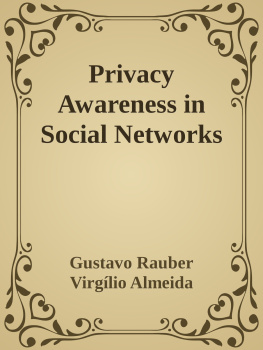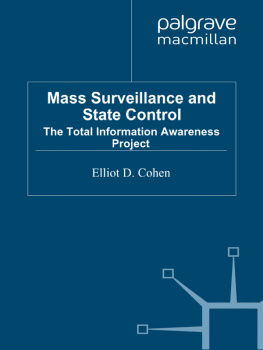The Politics of Personal Information
The Politics of Personal Information
Surveillance, Privacy, and Power in West Germany
Larry Frohman
First published in 2021 by
Berghahn Books
www.berghahnbooks.com
2021 Larry Frohman
All rights reserved. Except for the quotation of short passages for the purposes of criticism and review, no part of this book may be reproduced in any form or by any means, electronic or mechanical, including photocopying, recording, or any information storage and retrieval system now known or to be invented, without written permission of the publisher.
Library of Congress Cataloging-in-Publication Data
A C.I.P. cataloging record is available from the Library of CongressM
Library of Congress Cataloging-in-Publication Control Number:
2020048774
British Library Cataloguing in Publication Data
A catalogue record for this book is available from the British Library
Printed in the United States on acid-free paper
ISBN 978-1-78920-946-4 hardback
ISBN 978-1-78920-947-1 ebook
For Young-sun
Contents
Chapter 1
The Federal Population Registration Law, Administrative Power, and the Politicization of Privacy
Chapter 2
Rethinking Privacy in the Age of the Mainframe: From the Private Sphere to Informational Self-Determination
Chapter 3
The Legislative Path to the Federal Privacy Protection Law, 197077
Chapter 4
Only Sheep Let Themselves Be Counted: The 1983/87 Census Boycotts, the Census Decision, and the Question of Statistical Governance
Chapter 5
Out of the Frying Pan and into the Fire: The Census Decision, Party Politics, and the Revision of the Federal Privacy Protection Law
Chapter 6
Paper, Power, and Policing, 194872: The Federal Criminal Police on the Cusp of the Computer Age
Chapter 7
The Quest for Security and the Meaning of Privacy: Computers, Networks, and the Securitization of Space, Place, Movement, and Identity
Chapter 8
Mapping the Radical Milieu: Terrorism, Counterterrorism, and the New Police Surveillance
Chapter 9
The Reform of Police Law: Datenschutz, the Defense of Law, and the Debate over Precautionary Surveillance
Illustrations
Abbreviations
| AdSD | Archiv der sozialen Demokratie |
| AfS | Archiv fr Sozialgeschichte |
| AGG | Archiv Grnes Gedchtnis |
| AHR | American Historical Review |
| AIfS | Archiv des Instituts fr Sozialforschung (Hamburg) |
| BAK | Bundesarchiv Koblenz |
| BayHStA | Bayerisches Hauptstaatsarchiv |
| BDSG | Federal Privacy Protection Law (Bundesdatenschutzgesetz) |
| Berlin DSB | Berlin Beauftragter fr Datenschutz und Informationsfreiheit |
| BGBl. | Bundesgesetzblatt |
| BKA | Bundeskriminalamt |
| BMF | Bundesministerium der Finanzen |
| BMG | Bundesministerium fr Gesundheit |
| BMI | Bundesministerium des Innern |
| BMJ | Bundesministerium der Justiz |
| BMJFG | Bundesministerium fr Jugend, Familie und Gesundheit |
| Bulletin | Bulletin. Presse- und Informationsamt der Bundesregierung |
| BVerfGE | Entscheidungen des Bundesverfassungsgerichts |
| CDU | Christian Democratic Union |
| CILIP | CILIP: Brgerrechte & Polizei |
| CR | Computer und Recht |
| CSU | Christian Social Union |
| DV | Die ffentliche Verwaltung |
| Drs. | Drucksache (Bundestag unless otherwise noted) |
| DuD | Datenschutz und Datensicherheit (later Datenschutz und Datensicherung) |
| DVBl. | Deutsches Verwaltungsblatt |
| DVR | Datenverarbeitung im Recht |
| FAZ | Frankfurter Allgemeine Zeitung |
| FDP | Free Democratic Party |
| FR | Frankfurter Rundschau |
| GuG | Geschichte und Gesellschaft |
| GVBl. | Gesetz- und Verwaltungsblatt |
| HHStA | Hessisches Hauptstaatsarchiv |
| Interview | Interviews with a number of early privacy advocates and privacy commissioners are available at https://www.datenschutzzentrum.de/interviews/. |
| JMH | Journal of Modern History |
| JZ | Juristenzeitung |
| KJ | Kritische Justiz |
| KritV | Kritische Vierteljahresschrift fr Gesetzgebung und Rechtswissenschaft |
| LAB | Landesarchiv Berlin |
| LKA/LK | Landeskriminalamt/-mter |
| NJW | Neue juristische Wochenschrift |
| NRW | Landesarchiv Nordrhein-Westfalen |
| VD | ffentliche Verwaltung und Datenverarbeitung |
| PA-DBT | Parlamentsarchiv: Deutscher Bundestag (3114: Innenausschuss) |
| RDV | Recht der Datenverarbeitung |
| RuP | Recht und Politik |
| SPD | Social Democratic Party |
| StAH | Staatsarchiv Hamburg |
| StAF | Stadtarchiv Frankfurt/Main |
| Sten. Ber. | Stenographische Berichte (proceedings of the Bundestag) |
| StPO | Code of Criminal Procedure (Strafprozessordnung) |
| SZ | Sddeutsche Zeitung |
| VfZ | Vierteljahrshefte fr Zeitgeschichte |
| ZRP | Zeitschrift fr Rechtspolitik |
Acknowledgments
O ver the years, many people have served as sounding boards for larger and smaller portions of this project, commiserated with me, and provided support when it was most needed. Although these debts can only be poorly repaid through printed expressions of gratitude, I would nevertheless like to express my thanks to the Ann Arbor Germanists, especially Kathleen Canning, Geoff Eley, Young-sun Hong, Jennifer Jenkins, and Dennis Sweeney, who have adopted me into their extended academic and social family. Karrin Hanshew has been my most important intellectual interlocutor, and special thanks are due to her for her trenchant but constructive comments on the initial version of my chapters on police surveillance. On the other side of the Atlantic, I owe thanks to Heidrun Suhr, Dorothee Wierling, and especially Carola Sachse, who has been a wonderful guide to Berlin gastronomy, and who has never failed to skewer a loose argument. Closer to home, I would like to thank Iona Man-cheong, Kathleen Wilson, Alix Cooper, Janis Mimura, and Ira Livingston, as well as Renate Bridenthal.
I would also like to thank the various agencies that supported the research on which this work is based. A research visit grant from the German Academic Exchange Service helped get the project off the ground. Subsequent work was supported by summer fellowships from the Center for Contemporary History in Potsdam and the National Endowment for the Humanities. A Fulbright Research Fellowship later enabled me to spend a full year at the Center for Contemporary History, where I was associated with their research project on the advent of the digital society. My involvement with the Center made me more sensitive to the role of computerization and sharpened my understanding of the main themes in the historiography of contemporary Germany. I would like to thank the director, Frank Bsch, the members of the computerization group (Rdiger Bergien, Martin Schmitt, Julia Erdogan, Thomas Kasper, and Janine Funke), and all of the staff for creating a congenial and extraordinarily stimulating intellectual environment.










